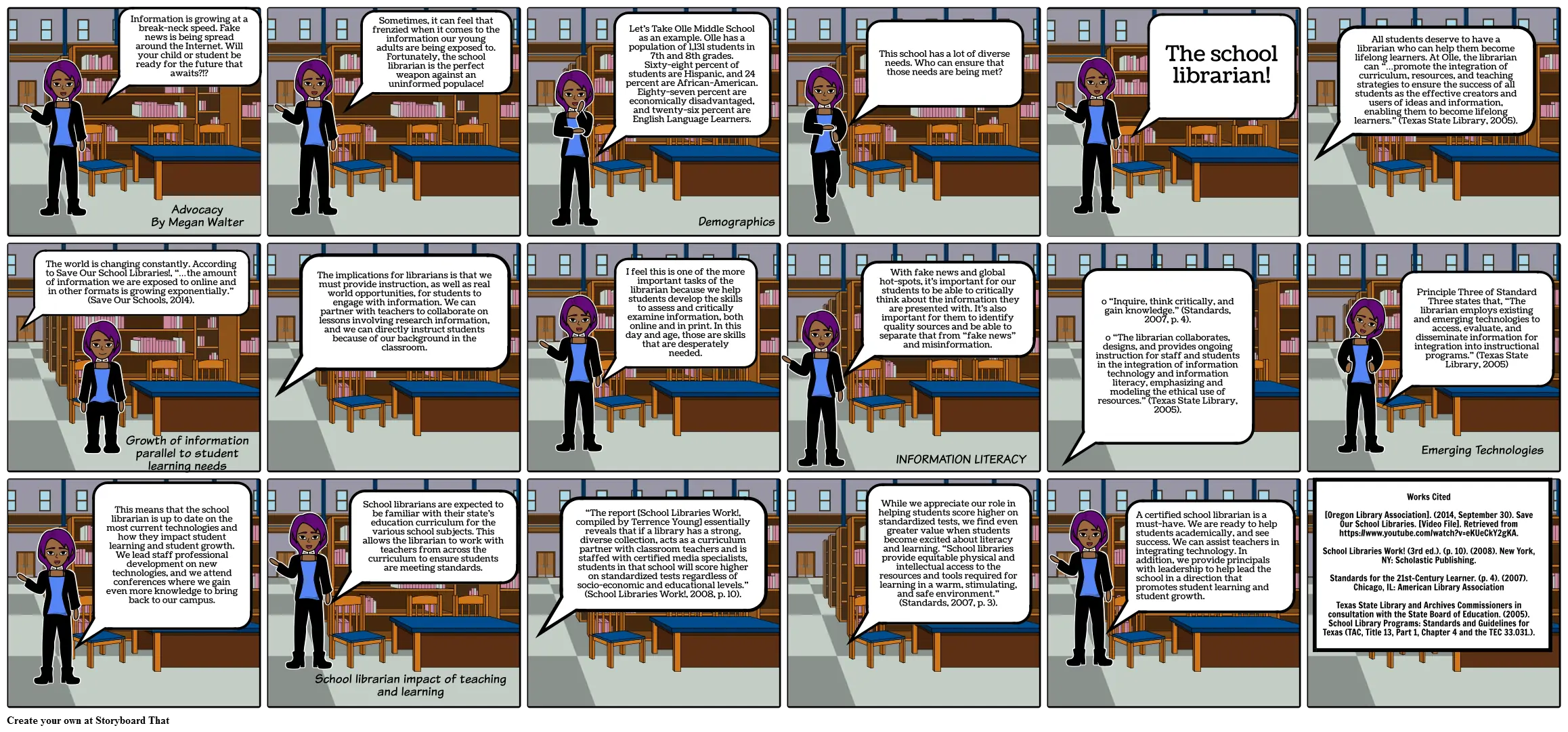Advocacy is not a Bad Word: Librarians as Advocates

Storyboard Description
School librarians are an important factor in student learning and student growth. We are an unparalleled resource for any successful school.
Storyboard Text
- Information is growing at a break-neck speed. Fake news is being spread around the Internet. Will your child or student be ready for the future that awaits?!?
- Advocacy By Megan Walter
- Sometimes, it can feel that frenzied when it comes to the information our young adults are being exposed to. Fortunately, the school librarian is the perfect weapon against an uninformed populace!
- Let’s Take Olle Middle School as an example. Olle has a population of 1,131 students in 7th and 8th grades. Sixty-eight percent of students are Hispanic, and 24 percent are African-American. Eighty-seven percent are economically disadvantaged, and twenty-six percent are English Language Learners.
- Demographics
- This school has a lot of diverse needs. Who can ensure that those needs are being met?
- The school librarian!
- All students deserve to have a librarian who can help them become lifelong learners. At Olle, the librarian can “…promote the integration of curriculum, resources, and teaching strategies to ensure the success of all students as the effective creators and users of ideas and information, enabling them to become lifelong learners.” (Texas State Library, 2005).
- The world is changing constantly. According to Save Our School Libraries!, “…the amount of information we are exposed to online and in other formats is growing exponentially.” (Save Our Schools, 2014).
- Growth of information parallel to student learning needs
- The implications for librarians is that we must provide instruction, as well as real world opportunities, for students to engage with information. We can partner with teachers to collaborate on lessons involving research information, and we can directly instruct students because of our background in the classroom.
- I feel this is one of the more important tasks of the librarian because we help students develop the skills to assess and critically examine information, both online and in print. In this day and age, those are skills that are desperately needed.
- With fake news and global hot-spots, it’s important for our students to be able to critically think about the information they are presented with. It’s also important for them to identify quality sources and be able to separate that from “fake news” and misinformation.
- INFORMATION LITERACY
- o “Inquire, think critically, and gain knowledge.” (Standards, 2007, p. 4). o “The librarian collaborates, designs, and provides ongoing instruction for staff and students in the integration of information technology and information literacy, emphasizing and modeling the ethical use of resources.” (Texas State Library, 2005).
- Principle Three of Standard Three states that, “The librarian employs existing and emerging technologies to access, evaluate, and disseminate information for integration into instructional programs.” (Texas State Library, 2005)
- Emerging Technologies
- This means that the school librarian is up to date on the most current technologies and how they impact student learning and student growth. We lead staff professional development on new technologies, and we attend conferences where we gain even more knowledge to bring back to our campus.
- School librarian impact of teaching and learning
- School librarians are expected to be familiar with their state’s education curriculum for the various school subjects. This allows the librarian to work with teachers from across the curriculum to ensure students are meeting standards.
- “The report [School Libraries Work!, compiled by Terrence Young] essentially reveals that if a library has a strong, diverse collection, acts as a curriculum partner with classroom teachers and is staffed with certified media specialists, students in that school will score higher on standardized tests regardless of socio-economic and educational levels.” (School Libraries Work!, 2008, p. 10).
- While we appreciate our role in helping students score higher on standardized tests, we find even greater value when students become excited about literacy and learning. “School libraries provide equitable physical and intellectual access to the resources and tools required for learning in a warm, stimulating, and safe environment.” (Standards, 2007, p. 3).
- A certified school librarian is a must-have. We are ready to help students academically, and see success. We can assist teachers in integrating technology. In addition, we provide principals with leadership to help lead the school in a direction that promotes student learning and student growth.
- Works Cited [Oregon Library Association]. (2014, September 30). Save Our School Libraries. [Video File]. Retrieved from https://www.youtube.com/watch?v=eKUeCkY2gKA. School Libraries Work! (3rd ed.). (p. 10). (2008). New York, NY: Scholastic Publishing. Standards for the 21st-Century Learner. (p. 4). (2007). Chicago, IL: American Library Association Texas State Library and Archives Commissioners in consultation with the State Board of Education. (2005). School Library Programs: Standards and Guidelines for Texas (TAC, Title 13, Part 1, Chapter 4 and the TEC 33.031.).
Over 30 Million Storyboards Created

